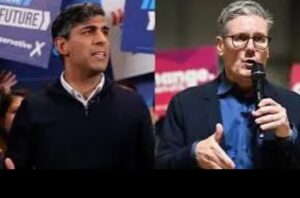

By Daniel Peters.

Sir Keir Starmer of the Labour Party in United Kingdom has announced that “change begins now” following a landslide victory in the general election.
The Labour leader has achieved the 326 seats required for a majority in the House of Commons, ending 14 years of Conservative governance.
Moments before the crucial number was reached, outgoing Prime Minister Rishi Sunak conceded defeat at his election count, stating: “The Labour Party has won this general election and I have called Sir Keir Starmer to congratulate him on his victory.”
Addressing a jubilant crowd of supporters shortly thereafter, a triumphant Sir Keir said: “We did it, you campaigned for it, you fought for it, you voted for it and now it has arrived, change begins now.”
He spoke of the UK experiencing the “sunlight of hope” once more, describing it as “pale at first but getting stronger through the day. Shining once again on a country with an opportunity after 14 years to get its future back.”
With more than 575 out of 650 seats declared, Labour is poised to form the next government with a majority of at least 100. The exit poll suggests Labour is on course to win 410 seats, more than doubling its previous count and giving it a majority of 170 in the House of Commons. This figure is close to the historic majority of 179 won in 1997 by Sir Tony Blair, Labour’s last elected Prime Minister.
The results signify a decisive shift away from the Tories, with the once dominant party projected to have just 131 MPs, the lowest number in its history, according to the exit poll.
After holding onto his seat, a solemn-looking Mr. Sunak acknowledged his party had faced a “difficult night” and took full responsibility for the outcome.
According to Sky News, he remarked: “The British people have delivered a sobering verdict tonight… and I take responsibility for the loss. To the many good, hard-working Conservative candidates who lost tonight… I am sorry.”
The results mark the first time a Labour Prime Minister will reside at Number 10 Downing Street since 2010, prompting the Conservatives to reassess the future direction of their party.
Ms. Mordaunt, a potential leadership contender if she had survived, said that the Conservatives had been “battered because it failed to honour the trust that people had placed in it.” She cautioned against a shift to the right, suggesting that party renewal would not be achieved by “talking to an ever smaller slice of ourselves, but being guided by the people of our country.”
Former Home Secretary Suella Braverman, seen as a leadership contender on the right, attributed the loss to the Conservatives “not keeping our promises.”
Mr. Shapps criticized the Tory “soap opera” that had alienated voters and warned against veering “off on some tangent, condemning ourselves to years of lacklustre opposition.”
The Conservatives have faced challenges not only from Labour but also from the Liberal Democrats and Reform UK.
Key moments from the dramatic night include:
– Several Tory cabinet ministers, including Grant Shapps and Penny Mordaunt, lost their seats to Labour.
– Others, like Alex Chalk and Gillian Keegan, were defeated by the Liberal Democrats as part of their plan to “smash” the Tory Blue Wall.
– Former Labour leader, Jeremy Corbyn, retained his seat as an independent.
– Reform UK leader Nigel Farage won a Commons seat on his eighth attempt.
– Green Party co-leader Carla Denyer defeated shadow culture Secretary Thangam Debbonaire in Bristol Central.
– Labour’s shadow Paymaster General Jonathan Ashworth lost his seat to an independent.
– Senior Conservative back bencher, Jacob Rees-Mogg, lost his seat to Labour.


